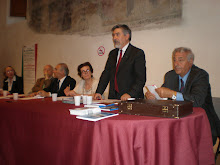Strengthening the Africa-EU Partnership on Peace and Security: How to Engage African Regional Organizations and Civil Society
edited by Nicoletta Pirozzi IAI Research Papers No. 6 October 2012 Pages 105, Euro 15,60 ISBN 978-88-6134-887-5 | |
The Joint Africa-European Union Strategy (JAES), adopted at the Lisbon Summit in December 2007, was conceived to overcome the unequal partnership between the African and European continents by establishing a framework of cooperation based on shared values and common objectives. In particular, it was designed as an inclusive and people-centred partnership, aimed at involving both institutional and non-institutional actors beyond the Brussels-Addis Ababa axis. However, already during the first implementation phase (2008-2010), it became clear that these conditions were far from being fully realized and needed a longer timeframe to display their potential. The Tripoli Summit in November 2010 and the second Action Plan (2011-2013) have tried to address some of these problems, but full implementation of the Joint Strategy is still a work in progress. This study analyses the sub-optimal involvement of two main stakeholders, namely African regional organizations - Regional Economic Communities (RECs) and Regional Mechanisms (RMs) - and civil society actors, especially non-governmental organizations. It addresses current engagement in and the potential of civil society's contribution to Africa-EU relations in the field of peace and security, by looking at their interaction with institutions on the continent and their added value in sectors such as early warning, crisis management, mediation and training. Finally, it offers some policy recommendations for the future implementation of the Joint Strategy, in particular on the issues of dialogue, capacity-building and funding. This study has been conducted by IAI in the framework of the project"Strengthening the Africa-EU partnership on peace and security: how to engage African regional organisations and civil society", commissioned by the Brussels-based Foundation for European Progressive Studies (FEPS) with the support of the European Parliament. Main findings and policy recommendations published also as IAI Working Paper 1228. Nicoletta Pirozzi is Senior Fellow in the European affairs area at the Istituto Affari Internazionali (IAI). Gianni Bonvicini, Valérie Vicky Miranda, Nicoletta Pirozzi, Kai Schäfer. | |
mercoledì 30 gennaio 2013
Un volume di interesse sulla patnerschip Eu-Africa
Iscriviti a:
Commenti sul post (Atom)





















Nessun commento:
Posta un commento